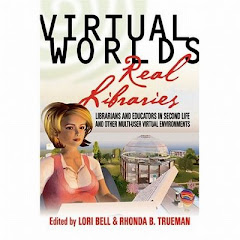Announcement: Certificate Program in Virtual Worlds
The University of Washington's Information School, in partnership withUniversity of Washington Educational Outreach, is excited to announcethe start of a new certificate program in Virtual Worlds. The programis a series of three consecutive courses, each 10 weeks and 3 credits,the first of which begins on January 8th, 2009. The program continuesthrough the Summer quarter, completing August 27th, 2009. Enrollment isopen to graduate students, undergraduates, and working professionals.The classes will all meet weekly on Thursday evenings from 6-9pm SLT(PT). Students will participate synchronously in virtual environments.The first class session meets in Second Life; students will also havethe opportunity to explore different Virtual Worlds platforms in use ineducational and business domains. Classes will include a combination ofexperiences including lecture, guest speakers, "field trips", andhands-on interactive activities. Each course includes a unique focus ondifferent facets of the implementation and use of virtual environments,and each successive course builds on the concepts of the previous. Theprogram objectives include both practical application of virtual worldsand an increased academic insight. Non-matriculated students whosuccessfully complete the three consecutive courses will receive a UWEOCertificate in Virtual Worlds. For additional information or to register:http://extension.washington.edu/ext/certificates/vir/vir_gen.asp
Or contact:Kristi PalmerProgram Manager, Academic ProgramsUniversity of Washington Educational Outreach206.221.0299kpalmer@EXTN.washington.edu
Program information:The courses in this program will combine enrollments of workingprofessionals seeking to apply Virtual Worlds inline with professionaldevelopment, and matriculated graduate and undergraduate students fromthe University of Washington's Information School. Program information may be found:http://extension.washington.edu/ext/certificates/vir/vir_gen.asp
Admission requirements:Participation in the program is restricted to students who have a) completed at least one year of college- or university-level study, b) attained computer literacy and are able to download and installsoftware from a website, c) experience in the use of basic internet applications (e.g., e-mail,web browsers and search) and computer operating systems (e.g., Windows,Mac OS, and Linux), and d) a valid e-mail account for the duration of the program.
English Proficiency: Students who are non-native English speakers are expected to haveadequate English language proficiency. Recommended Second Life skills:In order to gain the most value from your initial experiences in thevirtual classroom, we recommend that you establish a Second Lifeaccount, create an avatar, and become familiar with some basic skills inSecond Life, including:* Ability to comfortably walk, sit, turn, fly, and teleport * Ability to control the SL camera view* Ability to change your avatar's appearance and dress * Ability to use Second Life communication tools including IM, textchat, and voice chatSystem requirements:
For general guidelines on system requirements, seehttp://secondlife.com/corporate/sysreqs.php
This program will rely on in-world voice chat; a headset with microphone is required for voice/audio participation.
Course information:Selecting and Using Virtual WorldsWinter Quarter Schedule: (10 sessions) Thursdays, 6-9 p.m. SLT, Jan. 8-March 12, 2009, $789. 3 credits. Reg # 97795
Instructor: Randy Hinrichs
Description:Apply and combine concepts, processes, issues and skills frominformation management techniques, technology design and digital cultureformation to virtual worlds. Requires understanding of 3D systemsconcepts, Web markup languages, and end-user programming tools. Studentsanalyze three virtual world platforms, examining design methods anduser-centric design for human-information interaction. This is an integrative course that provides problem-solving opportunities andhands-on development for information students, requiring utilization ofknowledge gained from previous information technology studies.
Designing and Building Virtual Worlds Spring Quarter Schedule: (10 sessions) Thursdays, 6-9 p.m. SLT, April 2-June 4, 2009, $789. 3 credits. Reg #97796
Instructor: Janice Cowsert Description:Examine and apply concepts, strategies, and skills related to the lifecycle of virtual world planning, design, and product development. Focus on concepts of usability, architectural design, knowledge management andurban community factors. This course involves conceptual frameworks indesign, graphic relevance, and social networking practices that ensurethe scalability, reliability, and availability of 3D immersiveenvironments. Emphasis us given to Internet-based services for storingand accessing information to be used in integrated virtual worlddevelopment. This is an integrative course that builds onproblem-solving techniques learned in the Winter course and examinescomprehensive factors for designing and building immersive informationplatforms, requiring utilization of knowledge gained from previousinformation technology studies and organizational experience.
Virtual Worlds Interactivity and Metrics
Summer Quarter Schedule: (10 sessions) Thursdays, 6-9 p.m. SLT, June 25-August 27, 2009, $789. 3 credits. Reg. #97797
Instructor: Randy Hinrichs
Description:Examine methods for interactivity and use evaluation techniquesinvolving human factors, cognition, gaming strategies, performancetracking and feedback systems that ensure the 'stickiness' and definedvalue in virtual worlds. Ensure strategies and tool selection processfor interactivity factors and evaluation methods. Focus on databasemanagement techniques and programming for storage, retrieval, networkbalance and transactional interchange. This is an integrative coursethat builds on design and delivery techniques learned in the Springcourse and examines comprehensive factors for creating interactivity andmetrics in immersive information platforms, requiring utilization ofknowledge gained from previous information technology studies and organizational experience.
Tuesday, December 16, 2008
Subscribe to:
Post Comments (Atom)

 All
All Cross-World
Cross-World Activeworlds
Activeworlds Entropia
Entropia Habbo
Habbo Hipihi
Hipihi IMVU
IMVU Kaneva
Kaneva Lively
Lively Novoking
Novoking Openlife
Openlife Second Life
Second Life Smallworlds
Smallworlds Smeet
Smeet There
There Twinity
Twinity Vivaty
Vivaty Vizwoz
Vizwoz VMTV
VMTV Vside
Vside Weeworld
Weeworld
No comments:
Post a Comment